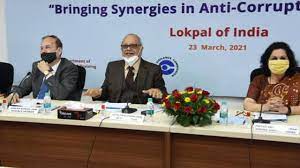Webinar On ‘Bringing Synergies In Anti-Corruption Strategies’:

The Lokpal of India organized a Webinar on ‘Bringing Synergies in Anti-Corruption Strategies’.
- Corruption can be defined as the abuse of entrusted power for private gain.
- It can impact a nation’s development in various ways.
Impact of Corruption:
- Political Costs: The political costs of corruption are manifested in weakened public trust in political institutions, reduced political participation, perversion of the electoral process, restricted political choices available to citizens, and loss of legitimacy of the democratic system.
- Economic Costs: Corruption reduces economic efficiency by misallocation of resources in favor of rent-seeking activities, increasing the cost of public transactions, acting as an additional tax on business thereby reducing investment, reducing genuine business competition.
- Social Costs: Corruption distorts the value systems and wrongly attaches elevated status to occupations that have rent-seeking opportunities. This results in a disillusioned public, a weak civil society, which attracts unscrupulous leaders to political life.
- Environmental Costs: Environmentally devastating projects are given preference in funding because they are easy targets for siphoning off public money into private pockets.
- Issues of national security: Corruption within security agencies can lead to a threat to national security, including through distortion of procurement, recruitment of ineligible persons, providing an easy route for smuggling of weapons and terrorist elements into the country, and money laundering.




